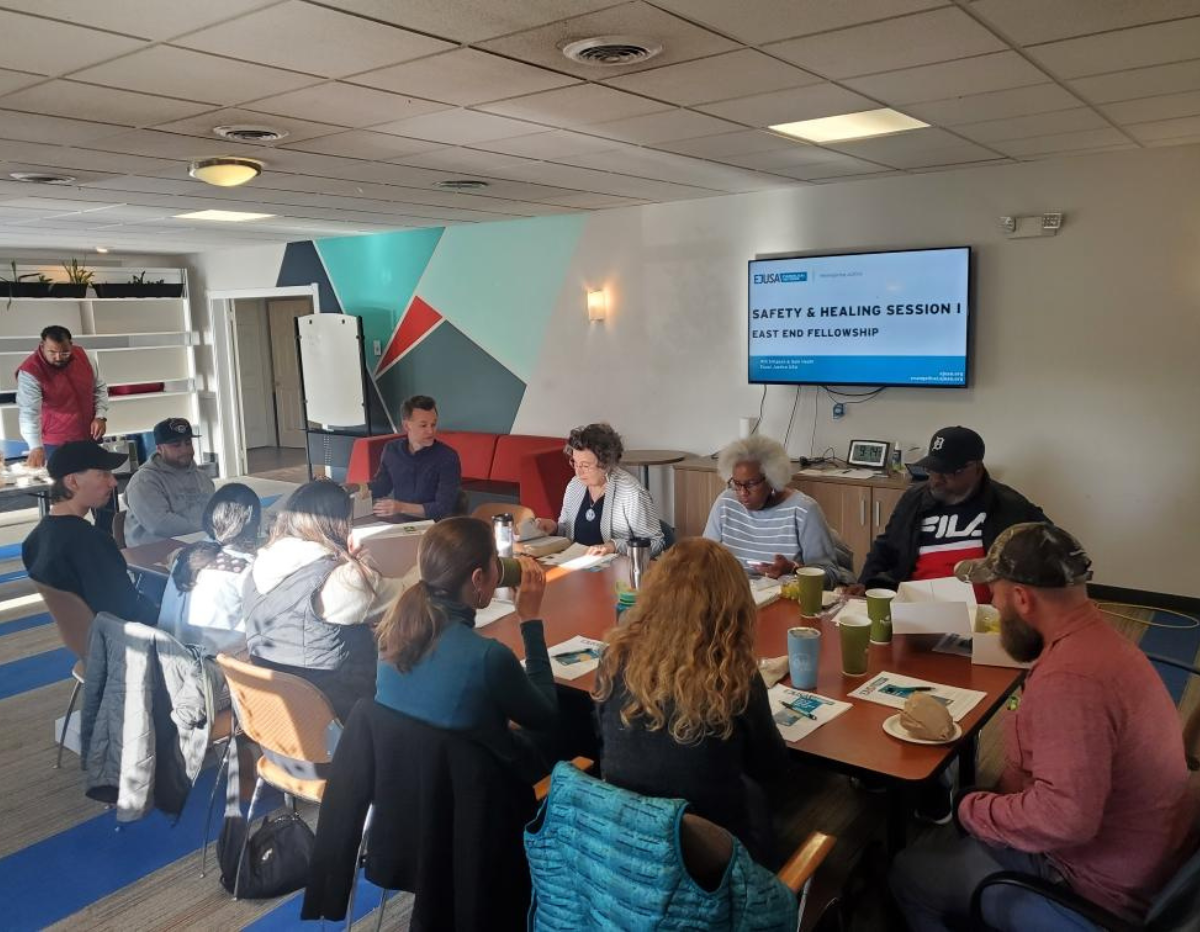
The idea began with a question: What would it look like to accompany a church willing to match faith with deeds so they can meet the justice needs in their community?
The question that led to an idea led to a journey to Richmond, VA. I teamed up with Will Simpson, EJUSA’s director of violence reduction initiatives, and Rev. Nathan Walton, co-lead pastor of East End Fellowship in Richmond and a member of the EJUSA Evangelical Network advisors group. Nathan extended an invitation to some members of his congregation to come to three meetings we held beginning last December. We called them Safety & Healing Sessions.
In our very first session, an older Black woman brought on a moment of silence after asking with exasperation, “Why do [the police] have to bring guns to a basketball game?!” Her frustration stemmed from seeing police repeatedly escalate situations and the criminal legal system as a whole using the only tools at its disposal: punishment, fear, and control.
The room was filled with Black and white people; married and single individuals; those from a variety of age brackets. All were united around wanting to learn how to more effectively respond to violence in their community.
Another participant referred to “gang violence,” which Will Simpson acknowledged and then nuanced to frame the deeper issue. “This is a breakdown in how to handle conflict,” Will said. “At the root of ‘gang violence’ are people reacting to other people in violent ways. And we can give people the tools to navigate that. We know what drives violence and how to break its cycle.”
We expanded people’s idea of safety from an absence of bodily violence to the presence of well-being for all. And we looked at the drivers of violence – things like poverty, shame, and racism – because we can never reduce violence without addressing what causes violence. Racism is especially important, since we often classify it as a social ill, which it is, rather than it also being a heresy that attempts to overthrow the supremacy of Christ with whiteness.
The first session looked at violence and our criminal legal system – from policing all the way to capital punishment. Session two, in January, focused on healing and how the Bible expands our idea of safety and healing. The third and final session, in February, got practical with steps for a way forward.
Trauma is real and often more so than we suppose. We speak about the three E’s of how trauma is an Event, an Experience of that event through a certain lens, and an individualized Effect of that event over time. Healing begins when we see the Bible itself as a trauma-informed book. Trauma is a modern word and yet an ancient reality.
Consider the trauma of Jesus – a criminal, from Rome’s perspective – who was arrested, tortured, falsely tried, and executed by the state. The Bible’s proximity to the state and its arsenal of evil is as close as the God-man that Christians call “Savior.”
Consider Jesus’ answer to the question, “Who is my neighbor?” The answer is the parable of the Good Samaritan, which defines neighbor as anyone who has need. In our sessions we saw how the Bible calls us to both stumble onto people and seek out people in need.
We do this by living through a lens of restoration, always asking, in each sphere we are in, How can I live restoratively here? Micah 6:8 is the founding verse for the Evangelical Network, and it gives a blueprint of the themes that should describe how Christians live and love in the world: acting justly, loving mercy, and walking humbly.
The people in the room felt stretched by all of this. Those in the room had lots of questions, heart-warming and heart-breaking stories, and had not fully considered the ramifications of Jesus himself being incarcerated and how Christian churches do not have to use the government’s tools of punishment, police, and prisons as our only response to harm.
Our time in these Safety & Healing Sessions concluded by defining and calling the group to build community-centered public safety ecosystems. What this looks like is a community, a neighborhood, or a city centering healing after harm; people working in complex ways to address the drivers of violence; groups that are interconnected and centering those most affected by violence; and creating and maintaining sustainable funding streams to local groups.
This is indeed happening in places like Newark, NJ and Baton Rouge, LA. And groups in Virginia, and in Richmond specifically, are beginning that work. We pointed this church to these groups. Groups like the Virginia Community Violence Coalition, the Virginia Coalition on Solitary Confinement, and Richmonders Involved to Strengthen Our Communities.
East End Fellowship is part of a growing movement of churches engaging resources like the Evangelical Network’s Church & Justice tool and considering how to bring true safety, healing, and accountability that repairs to their communities. They are asking the hard questions and willing to not assume that the way things are is the way they should be. They’re reimagining public safety, and churches are one of the many partners it will take to build communities where violence is rare and well-being is present for all.



